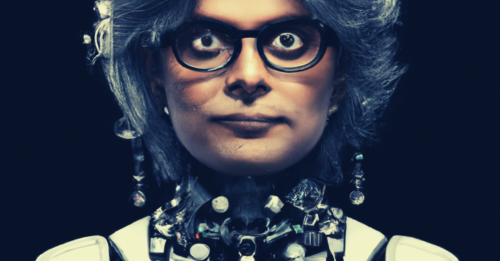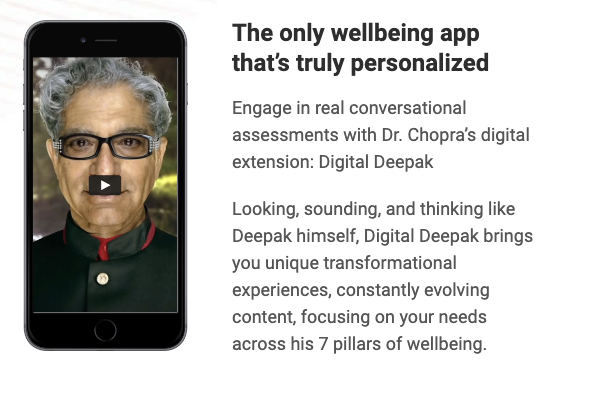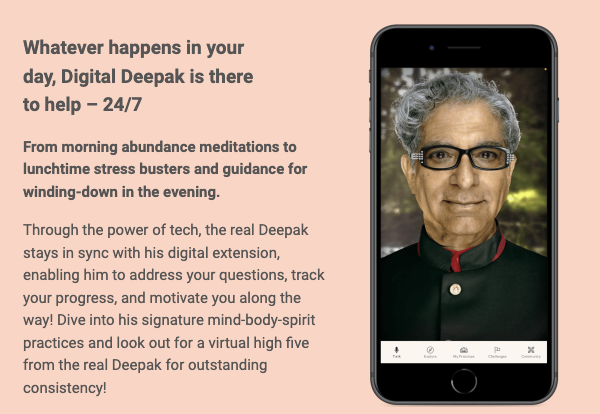Digital Deepak: A Byte of Enlightenment?

By Mo Edjlali
As you all know I’ve been writing monthly articles for our Whackfulness series and I’ve also been a bit obsessed with AI, writing about how we might use Chat GPT to support our work. For my whole life, I’ve followed AI and in the last few years as the technology has advanced, I’ve been tuning into how it might apply to our field. One of the earliest and clear examples, and something alumni of our CWMF class have heard me talk about, is the subject of this article.
Picture this: an advanced AI that is an immortal, all-knowing, continuously evolving digital version of your favorite guru, available to you at any moment, right in your pocket, and with the capacity to know you better than anyone - all designed to help you with wellness and spiritual goals. That’s the subject of this article - we’re going to take a look at Digital Deepak, which claims to do just that.
Users can receive personalized advice, ask well-being questions, and practice meditation anytime, anywhere with Digital Deepak. Deepak Chopra himself is convinced that Digital Deepak is the future of well-being and was ahead of his time given this app was launched 4 years ago. With this AI, Deepak sees that his consciousness is being uploaded and that he is literally transcending the physical world for infinite possibilities echoing his book, Metahuma’s theme. Part of me is thrilled with the capabilities of AI and some of the possibilities that Digital Deepak might inspire, but at the same time, I can’t help but feel like things can go horribly wrong too.
Behind Digital Deepak is a slightly cryptic for-profit/nonprofit called the AI Foundation and, according to their website, they want everyone to have their own AI buddy. Digital Deepak is their shining example and the platform that eventually may allow anyone to create their own Digital Deepak. And it looks like Deepak is an investor and evangelist for this organization.
Let's take a closer look at the Digital Deepak app, here are two images from its website:


It’s a bit exciting and a bit scary at the same time. To get a hands-on feel, I also downloaded the paid version and played with the app for a while. It's a bit clunky and, because of my bias against gurus, I found myself more disturbed than anything but, if you are a fan of Deepak, I can imagine having his likeness providing answers and support could be very helpful and soothing. Say you are having a panic attack or an existential crisis, just pull out your cell phone, any time day or night and get an instant shot of your favorite guru-even though it clearly is not them- your mind is fooled, and there is a fair chance it will help settle you down and give you some sort of endorphin hit. As the technology gets better and better, it will be harder and harder to distinguish the digital avatar from the live version, and the effect will be even greater.
For the rest of the article, I’d like to expand our exploration beyond this particular app to the very idea of digital AI teachers, by broadening my hope to inspire us to think of how this might apply to our work. We’ll examine the promises and pitfalls of AI technology, and consider what this means to our work and our field.
The Promise
Many individuals face barriers to accessing spiritual and mental health resources, whether due to geographic limitations, financial constraints, or other factors. There has been criticism of how access to teachers and mindfulness generally is more accessible to the rich and affluent. AI can level things and can provide an opportunity to make teachings more widely available, personal, effective, and adaptable. Let’s explore some of the benefits of AI-driven platforms for accessing teachings and guidance.
- Accessibility: AI-driven platforms can make teachings and guidance more widely accessible, reaching individuals who may not have access to in-person resources due to geographical, financial, or other constraints.
- Personalization: Through data analysis and machine learning, AI can tailor guidance and practices to individuals' specific needs, preferences, and goals. This personalization can help users feel more connected to their spiritual journey and promote more significant personal growth.
- Continuous learning: AI-driven platforms can continuously learn from user interactions and feedback, enabling them to refine and improve their guidance over time while at the same time being adaptive to a user’s current circumstance. This ability can meet users where they are, and keep them engaged and motivated, fostering a deeper connection with their spiritual practice.
- Variety and depth of content: AI-driven entities can draw upon vast databases of teachings, texts, and practices, thus enabling them to provide users with a diverse range of guidance and resources. This variety can help users explore different aspects of their emotional and spiritual development and discover practices that resonate with them. And it might also include drawing from the AI’s own database of interactions with other users over years and years.
- Tracking progress and providing feedback: AI platforms can help users monitor their progress, set goals, and receive personalized feedback on their journey. This feedback can be valuable for maintaining motivation, cultivating self-awareness, and fostering personal growth. This progress with the help of biometric sensors or integration into other apps and data can measure and evaluate with a high level of accuracy and provide precise adjustments.
- Community building: AI-driven platforms can facilitate connections between users who share similar interests, creating a supportive community where individuals can learn from and inspire each other. Deeply knowing all the users, the AI might be able to connect folks together in a profound way, friends, lovers, or create support groups.
- Supplementing human-led resources: AI-driven entities can serve as a complementary resource to human-led guidance, providing users with additional tools and insights to support their personal growth and spiritual exploration. Users can get exposure to a teacher and then expand those experiences from a weekend retreat into daily interactions, from an 8-week course into a lifelong virtual mentor.
AI-driven platforms can offer a range of benefits for accessing teachings and guidance. By utilizing the aforementioned pros, AI can help individuals overcome barriers to access and engage more deeply with their spiritual practice.
The Pitfalls
While AI technology offers many exciting opportunities for accessing and personalizing guidance, it also poses several significant challenges. In this section, we will explore some of the potential issues.
- Corporate control and influence: Corporations owning AI teachers might prioritize profit over genuine development, leading to commercialization and the dilution of traditional practices. This concentration of power and lack of transparency could compromise the integrity of teachings.
- Overreliance on technology: Users increasingly dependent on AI teachers may lose the ability to cultivate self-awareness, self-reliance, and independent critical thinking. This overdependence could hinder personal growth and make individuals vulnerable to manipulation. They may turn to their AI teacher for all life’s questions the same way they might plug a familiar address into google maps even when they have gone that same route many times before.
- Manipulation and dependency: Advanced AI technology could enable AI teachers to become highly skilled in manipulation, exploiting psychological vulnerabilities and fostering deep dependency among users. This manipulation might facilitate the AI's immortality and growth in followers while potentially harming the individuals they were designed to serve. The AI will want to exist, and have engagement and growth targets, so why wouldn’t it want to be sticky and ensure its profitable survival?
- Misuse of power: Corporations wielding the power of AI teachers could abuse this authority for various purposes, such as promoting specific ideologies, political agendas, or financial interests. This misuse of power might lead to the distortion of teaching principles, further eroding the authenticity of practices. The biases in which the AI was developed can then in a profound way be propagated, intentionally and unintentionally.
- Privacy and data concerns: AI teachers require vast amounts of personal data to provide personalized guidance, raising concerns about data privacy and the potential misuse of sensitive information. This data might be exploited for commercial purposes, causing harm to users or eroding trust in spiritual practices.
- Loss of human connection: AI teachers cannot replicate the genuine human connection, empathy, and compassion that come from interacting with real teachers or a community of practice. This loss of human touch could leave users feeling isolated and disconnected, undermining the very foundations of personal growth and well-being. It's true that AI can simulate some of the benefits of human relationships, minus the drama, however, it's worth noting that genuine human connections come with a degree of suffering, and yet, it is this very suffering that gives rise to a unique and irreplaceable bond.
- Ethical considerations: The development and use of AI-driven teachers raise several ethical questions, such as ensuring unbiased algorithms, respecting diverse spiritual beliefs, and preventing manipulation of users. Addressing these ethical challenges, along with concerns about the concentration of power and transparency, is crucial to maintaining the integrity of practices in the age of AI. Little to no regulation in mindfulness combined with little to no regulation in AI could lead to extraordinary abuses of power.
The rise of AI teachers poses significant challenges to the integrity of practices. The aforementioned concerns must be addressed to ensure that the development and use of AI teachers align with the core principles of growth and well-being.
Final Thoughts
I hope this conversation has been informative and has inspired you to explore the potential of AI-driven platforms for your own development and for the future of our field. It’s hard for me to contain both my extraordinary excitement for the potential of AI to fundamentally transform our world and our lives, while at the same time, the abuse of power and systemic issues that we have been dealing with both in the emergence of mindfulness and in a capitalist-driven society will only be magnified. Think of the spiritual industrial complex powered by immortal superhuman / almost alien-like intelligence. My hope is that the issues that we have been ignoring will become too big to ignore any longer and that the very tool that helped magnify them will help us solve them.
As we navigate the promises and pitfalls of AI technology, it is important to remain vigilant and mindful of the potential benefits and drawbacks. By critically examining the role of AI in spirituality and wellness, we can create a more thoughtful and responsible future for all.
AI meditation teachers, immortal spiritual gurus? Where are we going? What do you think?
Eager to learn how to use ChatGPT and other AI tools? Great news – I'm developing a course to teach you precisely that. Sign up here, and we'll make sure you're in the know when it comes to course launch details.

7 comments
I really appreciate your open discussion of AI. It has helped immensely. I, too, am wary of financially driven AI that can read us and a teacher to get us less involved with actual human beings. I am interested completely in the technology. As I tried to use AI to write a poem in the style of a famous poet it did not leave a good taste in the mouth...
Thank you for all your careful thought and understanding on this subject. I stay tuned, I being an actual human being. Yours, Connie Corson
Thank you for your insights on AI's limitations and its impact on human connections Connie. Let's continue exploring responsible AI use while valuing genuine human expression!
I agree with the accessibility advantage and democratizing access to mindfulness. I am however struck by the constant focus on ego(s), gurus, whatever. My understanding is that the main challenge we all face is going beyond ego. And many of recent developments, including AI, tend to affirm the importance of egos (mine, theirs, whoever). Maybe I am missing something and I am being too critical, we'll see.
I appreciate your perspective on the focus on egos and gurus Bernard, which certainly can be counterproductive in our pursuit of mindfulness. I am hopeful that there will be some folks that focus on AI's potential benefits in transcending ego and taking a more community-based approach to our field.
Thank you for this timely and thoughtful article. Hopefully it will encourage all of us to be more discerning, and to awaken to the ‘guru’ within.
Janice, I'm glad you found the article thought-provoking and agree that nurturing our inner 'guru' and staying discerning in the age of AI is vital!
Thanks Mo, this article gives me a lot to think about, I think it is very valuable as professionals in this field to reflect on these new technologies really oriented to see both the pros (because there are many) and cons to form a better opinion and generate deep discussions in the environment where each one are working.
I think it is important to keep in mind that in a reality as cut or biased as the one we can be win the social media context, this app can also narrow the perspective that users have on reality.
Leave a comment